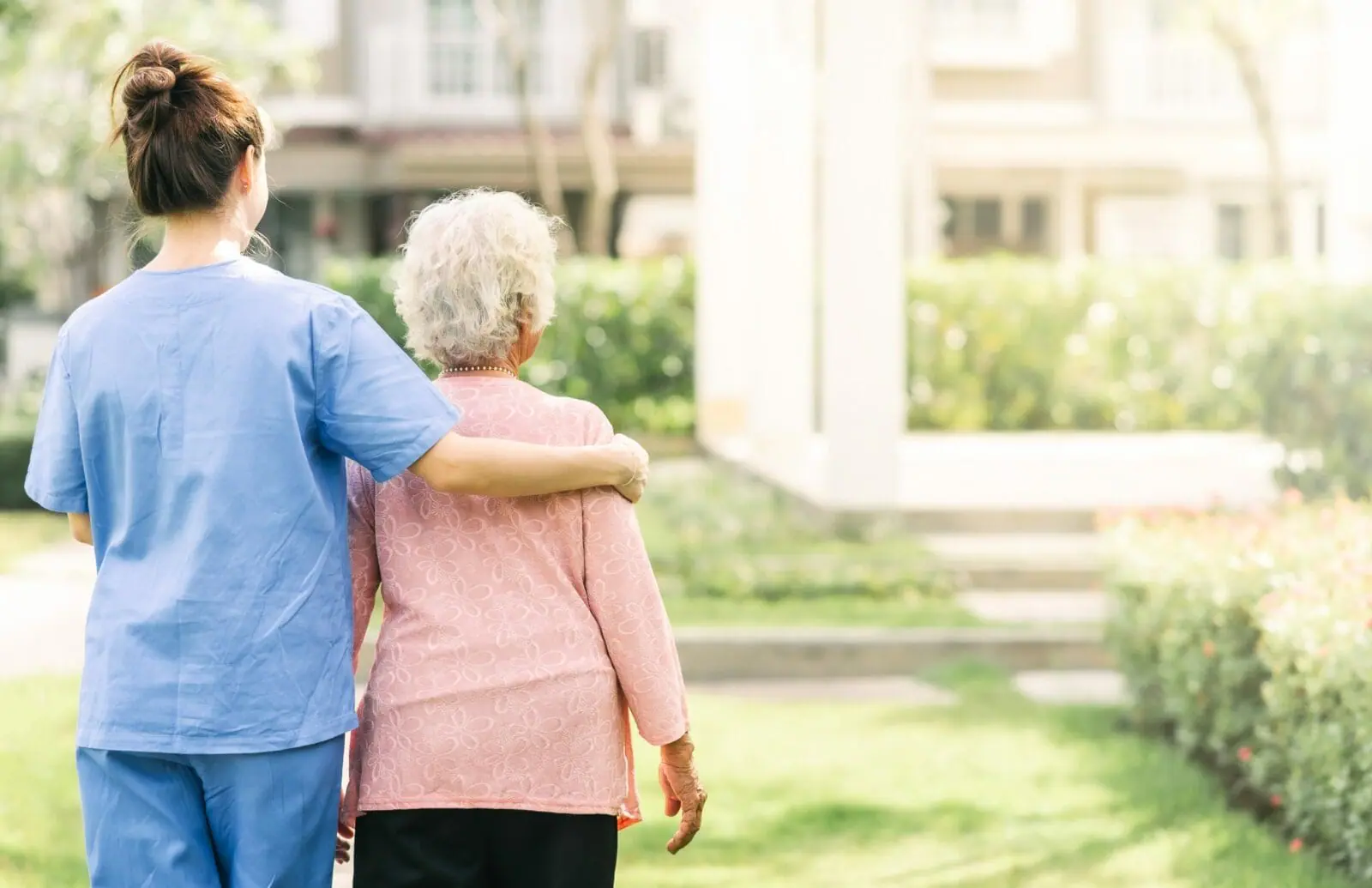Being a caregiver of any kind is challenging in any situation. Being a caregiver for elderly people can be even more challenging. Caring for someone in their final stage of life can be taxing emotionally, physically, and mentally. Senior caregivers have to care for someone who is used to caring for themselves, and often doesn’t want to have a caregiver at all. Elderly people also suffer from higher rates of dementia and cognitive decline than younger people, which can lead to erratic moods, personality changes, and sudden bouts of anger that can be difficult to handle. And unlike caring for children, taking care of an adult means helping someone who is similar in size to or larger than yourself. This can take a significant physical toll. That’s why you may need these self-care tips for caregivers of the elderly.
Senior caregivers also may be required to face the death of their charge or loved one. While death is a natural part of life, this can feel like a significant loss, especially for loved ones and people who have spent a lot of time and energy caring for an elderly person.
Since being a caregiver comes with all of these challenges, remembering to also take care of yourself is extremely important, both for your own well-being and for your effectiveness as a caregiver. In this article, we’ll review 8 self-care tips for caregivers of the elderly to keep you at your best, both for your own life and for your senior care recipient(s).
Caregiver Tip 1: Respect Your Health
As a caregiver, it can be easy to neglect your own health. While you may not face the same health challenges as your care recipient, your health still matters too. And someday, you’ll be an elderly person—you don’t want to regret taking care of your body while you are younger.
Make sure to get regular check-ups at the doctor, eat real food, and try to get enough sleep. We know all of these things are easier said than done, so we’re giving you permission to make that doctor’s appointment, buy yourself a salad, and get to bed a little earlier. Busy caregivers often don’t have time to sit down for healthy meals, so try to make good food choices whenever you can. Prioritize fruits and vegetables, whole grains, and protein whenever possible. Carry a water bottle so you can drink water throughout the day. Respect your own health, so you can continue to give the best care.
Caregiver Tip 2: Take Breaks and Say No
Burnout is a common occurrence in the caregiver profession. It’s also very common in people caring for their elderly parent(s) or loved ones. Taking care of a senior with significant physical or mental health conditions can feel like a never-ending task. It can be hard to take breaks, for example, when your loved one’s needs don’t take a break.
Prevent burnout by setting clear boundaries. If you work in a senior living community or other residential care environment, make sure to take lunch breaks and other breaks throughout the day, at least once every 4 hours. Don’t stay late at work unless it’s a true emergency. If the community isn’t able to meet their residents’ needs, talk to management about what they can do to improve. It is not your responsibility to work yourself into the ground to make up for poor management or inadequate staffing. Don’t be afraid to look for a better environment if your employers cannot respect reasonable boundaries.
If you care for a loved one in your own home, it’s even more difficult to set boundaries, but it’s also even more important. Consider hiring help so that you are able to get time outside of your home or time to focus on your own work, hobbies, interests, and family. If you can’t afford help, many volunteer organizations like Elder Helpers exist to get you a break when you need it. And if or when your loved one’s needs become a round-the-clock job, it’s time to consider senior living. Even if your parent or loved one doesn’t want to move to a community, it’s okay to advocate for your own needs. Your loved one may even be surprised by how much they enjoy senior living, and it’s sure to be better for your family and your relationship.
Caregiver Tip 3: Manage Stress Proactively
Caring for the elderly is a very stressful job, even when you set boundaries and take care of your own health. You can manage this stress with practices like meditation, mindfulness, deep breathing, and yoga. Other forms of exercise, like walking, running, swimming, or formal exercise classes, are also helpful for reducing and managing stress. Try adding one or two yoga classes a week if you can. There are many free yoga classes you can take at home online on sites like YouTube. If that seems like too much, try just taking a moment to take 10 deep breaths a few times a day. Even brief moments of mindfulness, meditation, or deep breathing can have a big impact on how you handle stress throughout the day.
Caregiver Tip 4: Stay Connected with Your Support System
Senior care can dominate your life, especially if you’re caring for a loved one within your home. Don’t lose touch with your support system! For many people, family is a great source of support. For example, if you’re caring for elderly parents, siblings can help lighten the load and understand what you’re going through. However, a support system goes far beyond family. You can find support through friends, neighbors, community members, church groups, or even support groups specifically for caregivers. You can even find caregiver support groups online, if that works better for your schedule or location.
Wherever you get it, the important thing is that you have support. It’s very difficult to spend all your time supporting someone else without also feeling cared for by people who love you. Don’t be afraid to reach out and ask for help, and express things you’re struggling with. Your support system can only help you if they know what’s going on in your life, so make sure you tell them!
Caregiver Tip 5: Seek Professional Help When Needed
Sometimes, you need help beyond the kind friends and family can give. Dealing with grief, depression, anxiety, or other mental health challenges can become much more difficult when you become a caregiver. This is especially true of caregivers of loved ones, but it can also happen to staff members at senior living communities. There’s nothing wrong with seeking counseling or psychiatric help when needed.
At-home caregivers of loved ones may also need to enlist professionals in providing care. Home health nurses, housekeepers, or even just grocery delivery services can be a huge benefit to manage some of the load. Many senior living communities also offer respite care or short-term care. Even if you don’t want your loved one to move to a residential care space permanently, a short-term stay of even just a few weeks can make a huge difference. It can also be a good way to “try out” senior living to see if it would work for your loved one.
Caregiver Tip 6: Keep Up With Hobbies
You are a whole person, not just a caregiver. Keep pursuing the hobbies and activities that bring you joy. If you don’t already have these hobbies, it’s time to start. Having activities that are exclusively yours, that provide you with happiness and peace, can be really helpful during challenging times. Here are some easy-to-start hobbies that even busy caregivers can find time for. This is one of our best self-care tips for caregivers of the elderly
- Knitting or crochet
- Reading or listening to audiobooks
- Coloring in adult coloring books
- Drawing or painting
- Hiking or walking outdoors
- Cooking
- Writing in a journal
Caregiver Tip 7: Keep Learning About Caregiving
Continuing your education about caregiving can empower you to feel more in control and less stressed at work. You can also learn about strategies to help you manage the challenges of caregiving that are specific to your loved one or resident(s). There are many resources available for caregivers. You might try books, online courses, or workshops about caregiving. If you work as a caregiver, a certification from an organization like American Caregiver Association might help you find future positions or even increase your pay. Many organizations offer free classes or courses, like Oregon Care Partners, the Red Cross, and the Family Caregiver Alliance.
Caregiver Tip 8: Think Positive
Sometimes, you don’t have any control over the circumstances of your caregiving role. You may not be able to find or afford professional help, you may not have a strong support system nearby, and you may find yourself so busy you don’t have time to take care of yourself the way you’d like to. This is an unfortunate reality of caregiving, especially for those caring for elderly parents or loved ones. However, the things you can control are your attitude and perspective.
Remind yourself of all that is good about your role as a caregiver. Often, providing care for someone who is in desperate need can be as rewarding as it is difficult. Celebrate the small “wins,” the low pain days, the walks in the fresh air, the good meals or special treats. Remember that if you are caring for elderly loved ones, your role will be temporary, because death is a natural part of life. Try to make the best of the time your loved one has left with you. If that isn’t possible, you can at least remember that this difficult time in both of your lives won’t last forever. Take it one day at a time.
Adopting a positive mindset and putting your role in perspective can make the long days and challenges of caregiving a little easier, or at the very least, a little more possible.
In Conclusion
As you can see, taking care of yourself as a caregiver isn’t selfish. It’s a necessity for anyone who spends the majority of their time taking care of someone else. Burnout is a common problem among caregivers. Prevent yourself from experiencing stress, burnout, anxiety, and other mental health issues by using these self-care tips for caregivers of the elderly. Take it one day and one small step at a time.
If you’re caring for a senior loved one, a senior living community could significantly ease the burden and improve both your life and your loved ones’. Speak with our Stellar Living Family Advisors today to see if senior living is right for you.
If you are a caregiver working at a senior living community, and you’re not happy with your job or the management of the community, check for job openings at Stellar Living! Our staff members report loving their jobs and feeling more supported and encouraged at Stellar communities than they did anywhere else.
Regardless of who you’re caring for or where you work, Stellar Living hopes you know that your role is vital and important. You matter! We hope these self-care tips for caregivers of the elderly help you in this noble position.




